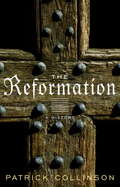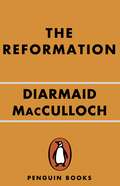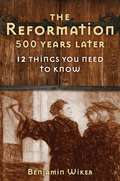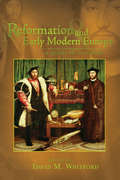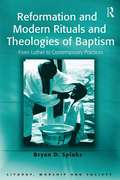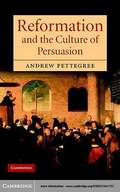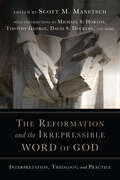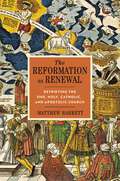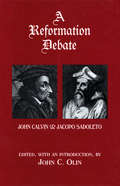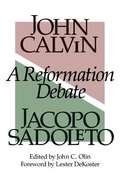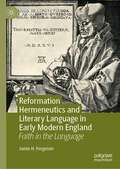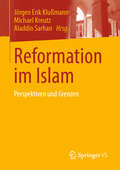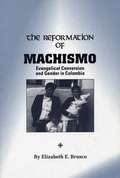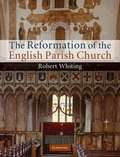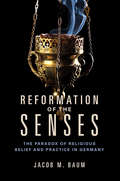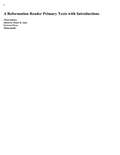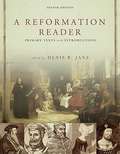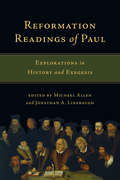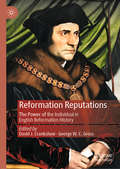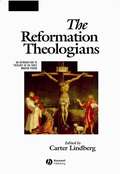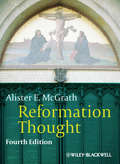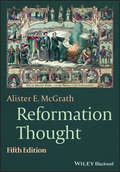- Table View
- List View
The Reformation
by Patrick Collinson“No revolution however drastic has ever involved a total repudiation of what came before it. ” The religious reformations of the sixteenth century were the crucible of modern Western civilization, profoundly reshaping the identity of Europe’s emerging nation-states. InThe Reformation, one of the preeminent historians of the period, Patrick Collinson, offers a concise yet thorough overview of the drastic ecumenical revolution of the late medieval and Renaissance eras. In looking at the sum effect of such disparate elements as the humanist philosophy of Desiderius Erasmus and the impact on civilization of movable-type printing and “vulgate” scriptures, or in defining the differences between the evangelical (Lutheran) and reformed (Calvinist) churches, Collinson makes clear how the battles for mens’ lives were often hatched in the battles for mens’ souls. Collinson also examines the interplay of spiritual and temporal matters in the spread of religious reform to all corners of Europe, and at how the Catholic Counter-Reformation used both coercion and institutional reform to retain its ecclesiastical control of Christendom. Powerful and remarkably well written,The Reformationis possibly the finest available introduction to this hugely important chapter in religious and political history. From the Hardcover edition.
The Reformation
by Diarmaid MaccullochThe Reformation and Counter-Reformation represented the greatest upheaval in Western society since the collapse of the Roman Empire a millennium before. The consequences of those shattering events are still felt today—from the stark divisions between (and within) Catholic and Protestant countries to the Protestant ideology that governs America, the world’s only remaining superpower.In this masterful history, Diarmaid MacCulloch conveys the drama, complexity, and continuing relevance of these events. He offers vivid portraits of the most significant individuals—Luther, Calvin, Zwingli, Loyola, Henry VIII, and a number of popes—but also conveys why their ideas were so powerful and how the Reformation affected everyday lives. The result is a landmark book that will be the standard work on the Reformation for years to come. The narrative verve of The Reformation as well as its provocative analysis of American culture’s debt to the period will ensure the book’s wide appeal among history readers.
The Reformation
by Diarmaid MaccullochThe Reformation and Counter-Reformation represented the greatest upheaval in Western society since the collapse of the Roman Empire a millennium before. The consequences of those shattering events are still felt today—from the stark divisions between (and within) Catholic and Protestant countries to the Protestant ideology that governs America, the world’s only remaining superpower.In this masterful history, Diarmaid MacCulloch conveys the drama, complexity, and continuing relevance of these events. He offers vivid portraits of the most significant individuals—Luther, Calvin, Zwingli, Loyola, Henry VIII, and a number of popes—but also conveys why their ideas were so powerful and how the Reformation affected everyday lives. The result is a landmark book that will be the standard work on the Reformation for years to come. The narrative verve of The Reformation as well as its provocative analysis of American culture’s debt to the period will ensure the book’s wide appeal among history readers.
The Reformation
by Diarmaid MaccullochThe Reformation and Counter-Reformation represented the greatest upheaval in Western society since the collapse of the Roman Empire a millennium before. The consequences of those shattering events are still felt today--from the stark divisions between (and within) Catholic and Protestant countries to the Protestant ideology that governs America, the world's only remaining superpower. In this masterful history, Diarmaid MacCulloch conveys the drama, complexity, and continuing relevance of these events. He offers vivid portraits of the most significant individuals--Luther, Calvin, Zwingli, Loyola, Henry VIII, and a number of popes--but also conveys why their ideas were so powerful and how the Reformation affected everyday lives. The result is a landmark book that will be the standard work on the Reformation for years to come. The narrative verve of The Reformation as well as its provocative analysis of American culture's debt to the period will ensure the book's wide appeal among history readers. .
The Reformation 500 Years Later: 12 Things You Need to Know
by Benjamin Wiker2017 is the 500th year anniversary of Martin Luther’s nailing his Ninety-five Theses to the door of Castle Church in Wittenberg, Germany, the event marking the beginning of the Reformation—and the end of unified Christianity. For Catholics, it was an unjustified rebellion by the heterodox. For Protestants, it was the release of true and purified Christianity from centuries-old enslavement to corruption, idolatry, and error. So what is the truth about the Reformation? To mark the 500th anniversary, historian Benjamin Wiker gives us 12 Things You Need to Know About the Reformation, a straight-forward account of the world-changing event that rejects the common distortions of Catholic, Protestant, Marxist, Freudian, or secularist retellings.
Reformation and Early Modern Europe: A Guide to Research (Sixteenth Century Essays & Studies #79)
by David M. WhitfordContinuing the tradition of historiographic studies, this volume provides an update on research in Reformation and early modern Europe. Written by expert scholars in the field, these eighteen essays explore the fundamental points of Reformation and early modern history in religious studies, European regional studies, and social and cultural studies. Authors review the present state of research in the field, new trends, key issues scholars are working with, and fundamental works in their subject area, including the wide range of electronic resources now available to researchers.Reformation and Early Modern Europe: A Guide to Research is a valuable resource for students and scholars of early modern Europe.
Reformation and Early Modern Europe: A Guide to Research (Sixteenth Century Essays & Studies #79)
by David M. WhitfordContinuing the tradition of historiographic studies, this volume provides an update on research in Reformation and early modern Europe. Written by expert scholars in the field, these eighteen essays explore the fundamental points of Reformation and early modern history in religious studies, European regional studies, and social and cultural studies. Authors review the present state of research in the field, new trends, key issues scholars are working with, and fundamental works in their subject area, including the wide range of electronic resources now available to researchers.Reformation and Early Modern Europe: A Guide to Research is a valuable resource for students and scholars of early modern Europe.
Reformation and Modern Rituals and Theologies of Baptism: From Luther to Contemporary Practices (Liturgy, Worship and Society Series)
by Bryan D. SpinksPresenting a comprehensive survey of the historical underpinnings of baptismal liturgies and theologies, Bryan Spinks presents an ecumenically and geographically wide-ranging survey and discussion of contemporary baptismal rites, practice and reflection, and sacramental theology. Writing within a clear chronological framework, Bryan Spinks presents two simultaneous volumes on Baptismal Liturgy and Theology. Early and Medieval Rituals and Theologies of Baptism summarizes the understandings of baptism in the New Testament and the development of baptismal reflection and liturgical rites throughout Syrian, Egyptian, Roman and African regions. In this second volume, Reformation and Modern Rituals and Theologies of Baptism, Spinks traces developments through the Reformation, liturgies in the eighteenth and nineteenth centuries, and explores important new ecumenical perspectives on developments of twentieth-century sacramental discussion. Present practices of Baptist, Amish, as well as Methodist, Roman Catholic, Lutheran, Reformed and Anglican denominations are also examined.
Reformation and the Culture of Persuasion
by Andrew PettegreeWhy did people choose the Reformation? What was in the evangelical teaching that excited, moved or persuaded them? Andrew Pettegree tackles these questions directly by re-examining the reasons that moved millions to this decisive and traumatic break with a shared Christian past. He charts the separation from family, friends, and workmates that adherence to the new faith often entailed and the new solidarities that emerged in their place. He explores the different media of conversion through which the Reformation message was communicated and the role of drama, sermons, song and the book. His findings offer a persuasive new answer to the critical question of how the Reformation could succeed as a mass movement in an age before mass literacy.
The Reformation and the Irrepressible Word of God: Interpretation, Theology, and Practice
by Scott M. ManetschAccording to Scripture, the Word of God is "living and active" (Heb 4:12). That affirmation was embraced by the Protestant Reformers, whose understanding of the Christian faith and the church was transformed by their encounter with Scripture. It is also true of the essays found in this volume, which brings together the reflections of church historians and theologians originally delivered at Trinity Evangelical Divinity School on the occasion of the 500th anniversary of the Reformation. As they consider historical, hermeneutical, theological, and practical issues regarding the Bible, these essays reveal that the irrepressible Word of God continues to transform hearts and minds.
The Reformation as Renewal: Retrieving the One, Holy, Catholic, and Apostolic Church
by Matthew BarrettA holistic, eye-opening history of one of the most significant turning points in Christianity, The Reformation as Renewal demonstrates that the Reformation was at its core a renewal of evangelical catholicity.In the sixteenth century Rome charged the Reformers with novelty, as if they were heretics departing from the catholic (universal) church. But the Reformers believed they were more catholic than Rome. Distinguishing themselves from Radicals, the Reformers were convinced they were retrieving the faith of the church fathers and the best of the medieval Scholastics. The Reformers saw themselves as faithful stewards of the one, holy, catholic, and apostolic church preserved across history, and they insisted on a restoration of true worship in their own day.By listening to the Reformers' own voices, The Reformation as Renewal helps readers explore:The Reformation's roots in patristic and medieval thought and its response to late medieval innovations.Key philosophical and theological differences between Scholasticism in the High Middle Ages and deviations in the Late Middle Ages.The many ways sixteenth and seventeenth century Protestant Scholastics critically appropriated Thomas Aquinas.The Reformation's response to the charge of novelty by an appeal to the Augustinian tradition.Common caricatures that charge the Reformation with schism or assume the Reformation was the gateway to secularism.The spread of Reformation catholicity across Europe, as seen in first and second-generation leaders from Luther and Melanchthon in Wittenberg to Zwingli and Bullinger in Zurich to Bucer and Calvin in Strasbourg and Geneva to Tyndale, Cranmer, and Jewel in England, and many others.The theology of the Reformers, with special attention on their writings defending the catholicity of the Reformation. This balanced, insightful, and accessible treatment of the Reformation will help readers see this watershed moment in the history of Christianity with fresh eyes and appreciate the unity they have with the church across time. Readers will discover that the Reformation was not a new invention, but the renewal of something very old.
A Reformation Debate: John Calvin & Jacopo Sadoleto
by John C. OlinIn 1539, Cardinal Jacopo Sadoleto, Bishop of Carpentras, addressed a letter to the magistrates and citizens of Geneva, asking them to return to the Roman Catholic faith. John Calvin replied to Sadoleto, defending the adoption of the Protestant reforms. Sadoleto’s letter and Calvin’s reply constitute one of the most interesting exchanges of Roman Catholic/Protestant views during the Reformationand an excellent introduction to the great religious controversy of the sixteenth century. These statements are not in vacuo of a Roman Catholic and Protestant position. They were drafted in the midst of the religious conflict that was then dividing Europe. And they reflect too the temperaments and personal histories of the men who wrote them. Sadoleto’s letter has an irenic approach, an emphasis on the unity and peace of the Church, highly characteristic of the Christian Humanism he represented. Calvin’s reply is in part a personal defense, an apologia pro vita sua, that records his own religious experience. And its taut, comprehensive argument is characteristic of the disciplined and logical mind of the author of The Institutes of the Christian Religion.
A Reformation Debate: Sadoleto's Letter to the Genevans and Calvin's Reply
by Jacopo Sadoleto John CalvinThe reformation controversy over justification and church authority is presented through primary sources: historic letters between John Calvin and Cardinal Sadoleto.
Reformation Hermeneutics and Literary Language in Early Modern England: Faith in the Language (Early Modern Literature in History)
by Jamie H. FergusonThe expressive and literary capacities of post-Reformation English were largely shaped in response to the Bible. Faith in the Language examines the convergence of biblical interpretation and English literature, from William Tyndale to John Donne, and argues that the groundwork for a newly authoritative literary tradition in early modern England is laid in the discourse of biblical hermeneutics. The period 1525-1611 witnessed a proliferation of English biblical versions, provoking a century-long debate about how and whether the Bible should be rendered in English. These public, indeed institutional accounts of biblical English changed the language: questions about the relation between Scripture and exegetical tradition that shaped post-Reformation hermeneutics bore strange fruit in secular literature that defined itself through varying forms of autonomy vis-a-vis prior tradition.
Reformation im Islam: Perspektiven und Grenzen
by Jörgen Erik Klußmann Michael Kreutz Aladdin SarhanDass der Islam in der modernen Welt, die von Demokratie, Säkularismus und Fortschritt geprägt ist, nur bestehen könne, wenn er eine Reformation durchlaufe, wird von den einen behauptet, von den anderen bestritten und ist Gegenstand einer bis heute andauernden Debatte, die sich mindestens bis auf das frühe 20. Jahrhundert zurückverfolgen lässt. Dieser Sammelband lässt Stimmen für und wider eine Reformation im Islam zu Wort kommen und rückt die Debatte in das Licht aktueller Ereignisse und Herausforderungen, zu denen nicht zuletzt der Aufstieg des Salafismus gehört. Der InhaltEinführungReformation als HerausforderungIslam und PolitikReformation und die Geschlechterfrage Vergleichende PerspektivenDie ZielgruppenPhilosophenTheologenSozialwissenschaftlerPolitik- und ReligionswissenschaftlerHistorikerDie HerausgeberJörgen Erik Klußmann ist Studienleiter an der Evangelischen Akademie im Rheinland und nebenberuflich Coach und Trainer für soziokulturelle und religiöse Sensibilisierung sowie für systemische Konflikttransformation.Dr. Michael Kreutz ist Politologe und Orientalist in Bochum mit den Arbeitsschwerpunkten Moderne Geschichte des Nahen Ostens und Südosteuropas, politische Ideengeschichte, Europa und der Islam, Religion und Politik.Aladdin Sarhan ist Islamwissenschaftlicher Referent und Sachverständiger in der Abteilung Staatsschutz des Landeskriminalamts Rheinland-Pfalz.
The Reformation of Machismo: Evangelical Conversion and Gender in Colombia
by Elizabeth E. BruscoProtestant evangelicalism has spread rapidly in Latin America at the same time that foreign corporations have taken hold of economies there.<P><P> These concurrent developments have led some observers to view this religious movement as a means of melding converts into a disciplined work force for foreign capitalists rather than as a reflection of conscious individual choices made for a variety of personal, as well as economic, reasons. In this pioneering study, Elizabeth Brusco challenges such assumptions and explores the intra-household motivations for evangelical conversion in Colombia. She shows how the asceticism required of evangelicals (no drinking, smoking, or extramarital sexual relations are allowed) redirects male income back into the household, thereby raising the living standard of women and children. This benefit helps explain the appeal of evangelicalism for women and questions the traditional assumption that organized religion always disadvantages women. Brusco also demonstrates how evangelicalism appeals to men by offering an alternative to the more dysfunctional aspects of machismo. Case studies add a fascinating human dimension to her findings. With the challenges this book poses to conventional wisdom about economic, gender, and religious behavior, it will be important reading for a wide audience in anthropology, women's studies, economics, and religion. For all students of Latin America, it offers thoughtful new perspectives on a major, grass-roots agent of social change.
The Reformation of the English Parish Church
by Robert WhitingIn the sixteenth century, the people of England witnessed the physical transformation of their most valued buildings: their parish churches. This is the first ever full-scale investigation of the dramatic changes experienced by the English parish church during the English Reformation. By drawing on a wealth of documentary evidence, including court records, wills and church wardens' accounts, and by examining the material remains themselves such as screens, fonts, paintings, monuments, windows and other artefacts found in churches today, Robert Whiting reveals how, why and by whom these ancient buildings were transformed. He explores the reasons why Catholics revered the artefacts found in churches as well as why these objects became the subject of Protestant suspicion and hatred in subsequent years. This richly illustrated account sheds new light on the acts of destruction as well as the acts of creation that accompanied religious change over the course of the 'long' Reformation.
Reformation of the Senses: The Paradox of Religious Belief and Practice in Germany (Studies in Sensory History)
by Jacob M. BaumWe see the Protestant Reformation as the dawn of an austere, intellectual Christianity that uprooted a ritualized religion steeped in stimulating the senses--and by extension the faith--of its flock. Historians continue to use the idea as a potent framing device in presenting not just the history of Christianity but the origins of European modernity. Jacob M. Baum plumbs a wealth of primary source material from the fifteenth and sixteenth centuries to offer the first systematic study of the senses within the religious landscape of the German Reformation. Concentrating on urban Protestants, Baum details the engagement of Lutheran and Calvinist thought with traditional ritual practices. His surprising discovery: Reformation-era Germans echoed and even amplified medieval sensory practices. Yet Protestant intellectuals simultaneously cultivated the idea that the senses had no place in true religion. Exploring this paradox, Baum illuminates the sensory experience of religion and daily life at a crucial historical crossroads. Provocative and rich in new research, Reformation of the Senses reevaluates one of modern Christianity's most enduring myths.
A Reformation Reader: Primary Texts And Introductions, 3rd Edition
by Denis R. JanzAlthough deeply political, economic, and social, the European Reformations of the sixteenth century were at heart religious disputes over core Christian theological issues. Denis Janz's A Reformation Reader is unabashed in its generous selection of key theological and related texts from five distinct Reformation sites. The late-medieval background is richly discussed and the Lutheran, Calvinist, Radical, English, and Catholic Reformations are all thoroughly presented. A classroom staple for nearly 30 years, this new third edition of the text takes into account the needs of the contemporary classroom for primary source readings that are concise and focused on the subject matter at hand. Over 100 carefully selected primary documents are edited for even greater concision and capture the energy and moment of that tumultuous time. The saving of space results in a shorter, more tightly presented book that now includes even more readings! Students and teachers alike will appreciate the expanded range and fresh focus of this classic reader.
A Reformation Reader: Primary Texts with Introductions
by Denis R. Janz* More than 100 carefully edited primary Refomation documents *Key theological writings from Luther, Calvin, Zwingli, and more * Companion Web site features professor-and student-friendly resources
Reformation Readings of Paul: Explorations in History and Exegesis
by Michael AllenDid the Protestant Reformers understand Paul correctly? Has the church today been unduly influenced by Reformation-era misreadings of the Pauline epistles? These questions—especially as they pertain to Martin Luther's interpretation of the Pauline doctrine of justification—have been at the forefront of much discussion within biblical studies and theology in light of the New Perspective on Paul. But that leads to another question: Have we understood the Reformers correctly? With that in mind, these essays seek to enable a more careful reading of the Reformers' exegesis of Pauline texts. Each chapter pairs a Reformer with a Pauline letter and then brings together a historical theologian and a biblical scholar to examine these Reformation-era readings of Paul. In doing so, this volume seeks a better understanding of the Reformers and the true meaning of the biblical text.
Reformation Reputations: The Power of the Individual in English Reformation History
by David J. Crankshaw George W. C. GrossThis book highlights the pivotal roles of individuals in England’s complex sixteenth-century reformations. While many historians study broad themes, such as religious moderation, this volume is centred on the perspective that great changes are instigated not by themes, or ‘isms’, but rather by people – a point recently underlined in the 2017 quincentenary commemorations of Martin Luther’s protest in Germany. That sovereigns from Henry VIII to Elizabeth I largely drove religious policy in Tudor England is well known. Instead, the essays collected in this volume, inspired by the quincentenary and based upon original research, take a novel approach, emphasizing the agency of some of their most interesting subjects: Protestant and Roman Catholic, clerical and lay, men and women. With an introduction that establishes why the commemorative impulse was so powerful in this period and explores how reputations were constructed, perpetuated and manipulated, the authors of the nine succeeding chapters examine the reputations of three archbishops of Canterbury (Thomas Cranmer, Matthew Parker and John Whitgift), three pioneering bishops’ wives (Elizabeth Coverdale, Margaret Cranmer and Anne Hooper), two Roman Catholic martyrs (John Fisher and Thomas More), one evangelical martyr other than Cranmer (Anne Askew), two Jesuits (John Gerard and Robert Persons) and one author whose confessional identity remains contested (Anthony Munday). Partly biographical, though mainly historiographical, these essays offer refreshing new perspectives on why the selected figures are famed (or should be famed) and discuss what their reformation reputations tell us today.
The Reformation Theologians: An Introduction to Theology in the Early Modern Period
by Carter LindbergThe Reformation Theologians is the ideal introduction to the study of the sixteenth-century Reformations. It introduces the theological context, though, and contributions of theologians from this period, offering students and scholars an essential resource and insight. This comprehensive and lively book discusses all the major strands of Reformation thought and explores the work of a range of influential figures, including theologians and non-theologians, humanists, clergy and laity, men and women. The contributors to this volume are leading scholars in the field of historical and systematic theology. Accessibly structured, it covers the Humanist, Lutheran, Reformed, Roman Catholic, and "Radical" Theologians. An introductory chapter explores the interpretations of the Reformation and a concluding chapter explains the influence of Reformation theologies on the modern period. The text also includes useful bibliographies and a glossary of theological terms.
Reformation Thought: An Introduction
by Alister E. McGrathReformation Thought, 4th edition offers an ideal introduction to the central ideas of the European reformations for students of theology and history. Written by the bestselling author and renowned theologian, Alister McGrath, this engaging guide is accessible to students with no prior knowledge of Christian theology. This new edition of a classic text has been updated throughout with the very latest scholarship Includes greater coverage of the Catholic reformation, the counter-reformation, and the impact of women on the reformation Explores the core ideas and issues of the reformation in terms that can be easily understood by those new to the field Student-friendly features include images, updated bibliographies, a glossary, and a chronology of political and historical ideas This latest edition retains all the features which made the previous editions so popular with readers, while McGrath's revisions have ensured it remains the essential student guide to the subject.
Reformation Thought: An Introduction
by Alister E. McGrathReformation Thought Praise for previous editions:“Theologically informed, lucid, supremely accessible: no wonder McGrath’s introduction to the Reformation has staying power!”—Denis R. Janz, Loyola University“Vigorous, brisk, and highly stimulating. The reader will be thoroughly engaged from the outset, and considerably enlightened at the end.”—Dr. John Platt, Oxford University“[McGrath] is one of the best scholars and teachers of the Reformation... Teachers will rejoice in this wonderfully useful book.”—Teaching HistoryReformation Thought: An Introduction is a clear, engaging, and accessible introduction to the European Reformation of the sixteenth century. Written for readers with little to no knowledge of Christian theology or history, this indispensable guide surveys the ideas of the prominent thought leaders of the period, as well as its many movements, including Lutheranism, Calvinism, Anabaptism, and the Catholic and English Reformations. The text offers readers a framework to interpret the events of the Reformation in full view of the intellectual landscape and socio-political issues that fueled its development.Based on Alister McGrath’s acclaimed lecture course at Oxford University, the fully updated fifth edition incorporates the latest academic research in historical theology. Revised and expanded chapters describe the cultural backdrop of the Reformation, discuss the Reformation’s background in late Renaissance humanism and medieval scholasticism, and distill the findings of recent scholarship, including work on the history of the Christian doctrine of justification. A wealth of pedagogical features—including illustrations, updated bibliographies, a glossary, a chronology of political and historical ideas, and several appendices—supplement McGrath’s clear explanations.Written by a world-renowned theologian, Reformation Thought: An Introduction, Fifth Edition upholds its reputation as the ideal resource for university and seminary courses on Reformation thought and the widespread change it inspired in Christian belief and practice.
